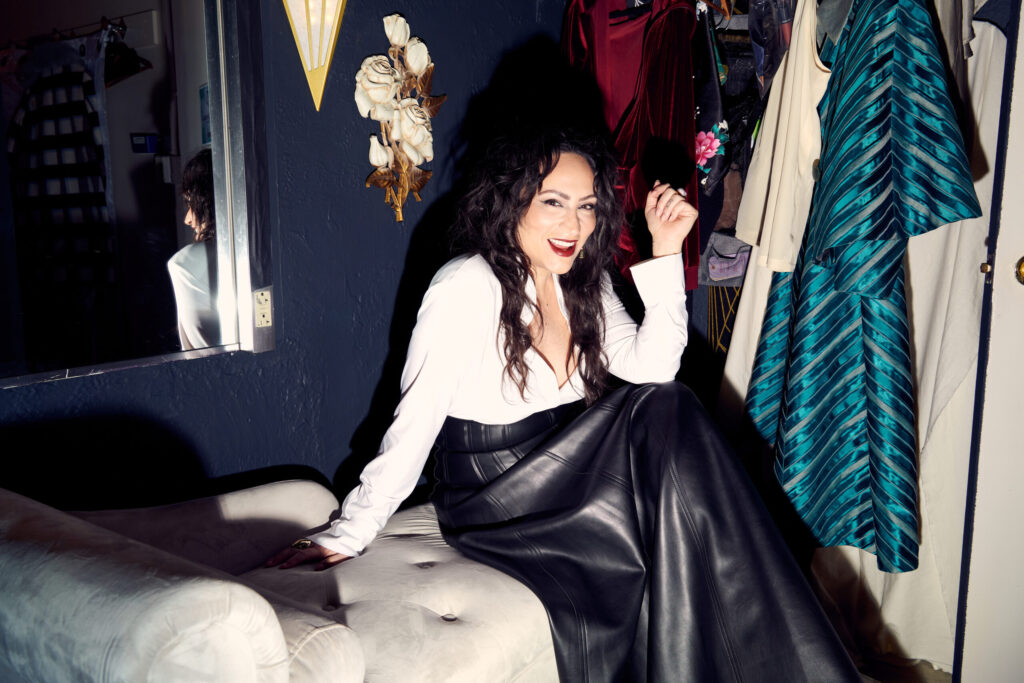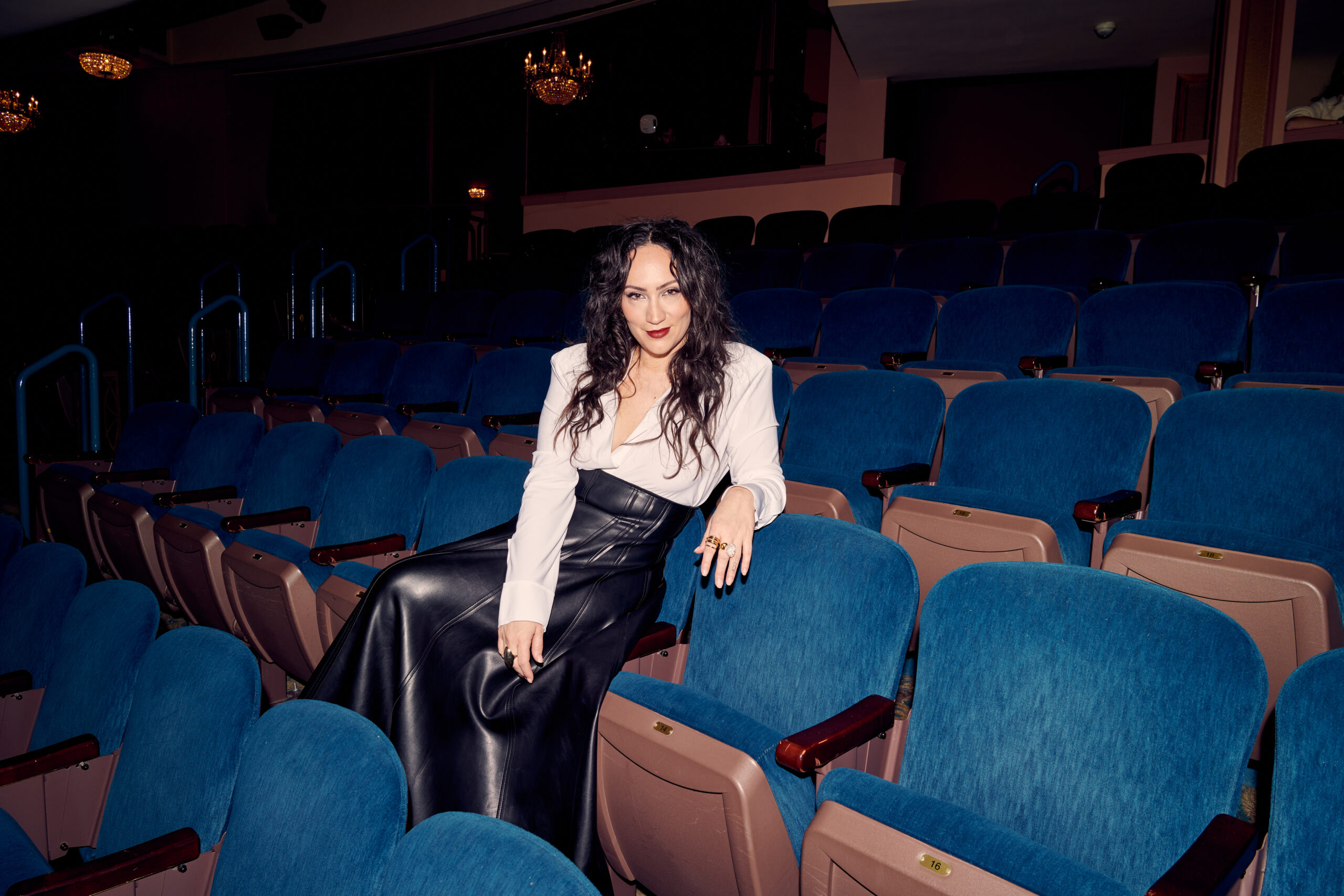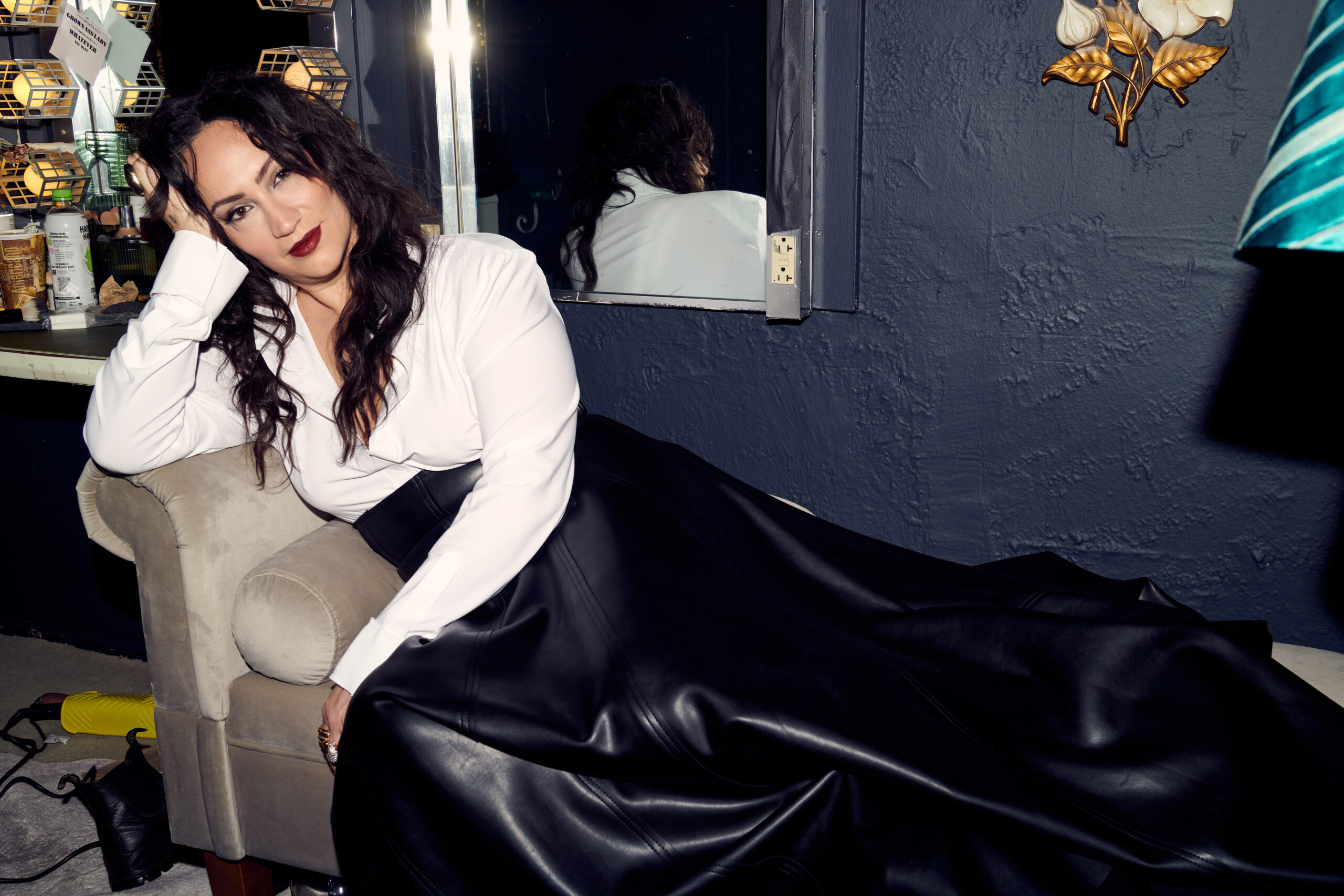The morning I spoke to the actor Eden Espinosa, who currently stars in the original Broadway musical Lempicka about the visionary art deco painter of the same name, she was wearing an Era’s Tour t-shirt. I hadn’t known Espinosa was a Swiftie, though it occurred to me that Tamara de Lempicka was the kind of outsized and trailblazing heroine of whom Swift, who once turned the life of the eccentric 1940s heiress-cum-socialite Rebekah Harkness into a winking earworm, would be fond. In 1917, Lempicka fled Russia during the revolution for Paris, where she would come to paint the mannered and highly stylized portraits of Jazz Age women that would later establish her as a pioneer of the form and a feminist icon. “I’ve cried both times I’ve seen her work in person,” Espinosa told me. “The most fascinating thing about her work … is the colors and the way it feels like they’re lit from within.” Yet, as the show posits, Lempicka was also a bit of a lightning rod, a woman whose voracious appetite and instincts for survival would lead her to lie and manipulate reality and carry on affairs with both men and women. Earlier in her career, Espinosa explained, she might have avoided characters who don’t reflexively summon the audience’s sympathies. But she’s no longer playing to the crowd. Last week, as the 46-year-old prepared to return to the show after spending a few days under the weather, she talked to me about getting back to her Broadway roots, embracing complicated women, and, of course, The Tortured Poet’s Department.
———
JAKE NEVINS: Hi there, Eden.
EDEN ESPINOSA: Hi. How are you?
NEVINS: I’m doing well. Feeling better?
ESPINOSA: I am on the mend. I think I’m going to be in the show tonight, which I’m excited about, but I’ve been a little under the weather.
NEVINS: I see you’re wearing an Era’s Tour t-shirt. Today’s a big day for us Swifties.
ESPINOSA: Today is a big day and the Lyft I’m in is playing “I Knew You Were Trouble,” so the synergy is all around.
NEVINS: Have you given Tortured Poets a listen yet?
ESPINOSA: I did, but only the first three songs on the way to the doctor’s office earlier today. I’m hoping to get some in later right before the show.
NEVINS: I woke up to the news that she dropped a whole second album, so I’m trying to find the time to sit with it.
ESPINOSA: I like to do a deep-dive, so I’ll do a peripheral listen but then I’ll really get into it later. She’s one of my favorite songwriters, so I like to really dive into all of it.
NEVINS: Well, I had the pleasure of seeing Lempicka this week, which was such a tour de force. This is your first return to the Broadway stage in about a decade-and-a-half, right?
ESPINOSA: Yeah. It has been quite a long time since I’ve been on Broadway, and even longer since I originated something on Broadway. It’s been 20 years. When I first came up in this town and this industry and the Broadway community, I naively thought, “Okay, once you dip your toe into the pool, you just get to stay at the pool party as long as you want.” But over time I lost myself in, “What am I worth if I’m not working in this 10-block radius? What do I have to offer?” Going to an acting program was a huge turning point for me. I went to the William Esper Studio for two years and just got back to my craft and the type of work that I wanted to do. I’ve been chasing that ever since: projects that really speak to me, that challenge me, that push me beyond my comfort zone and light me up inside. Lempicka was one of those projects long before I was involved in it. I heard the music and read the script and I just fell in love with it. I knew I had something to offer in this role even nine years ago. But I wouldn’t have been able to play her the way I’m playing her today. In particular, for this show, everyone is firing on all cylinders, from set design, to projections, to costumes, to orchestrations. I think that people are responding to that. Whether their opinion of the show is good or bad, they’re encouraging people to form their own opinions, which is what art is all about.
NEVINS: Right. And to your point, there is a lot happening in Lempicka. I’d love to hear how it spoke to you when you first encountered it, since you said you felt your own perspective might enhance or augment the show.
ESPINOSA: I saw a concert presentation of a show called Witness Uganda that Matt Gould had also co-wrote and wrote the music. I sent him a message and I was just like, “Can I hear any more of your stuff?” He sent me Lempicka, and I just immediately was captivated by this woman and the music and her story. I was fresh off of my acting program. I was fresh off of learning these tools for creating a character, so I saw her story in a way that I hadn’t seen done yet. I just knew that I had a singular perspective on how to play her in the way that she reflects lessons on how to expand and take up space. That is the biggest lesson for me at this moment, to unapologetically fill up a room the way you’re meant to and have the ambition and the drive to go for something and not apologize for it and not make it pretty if it’s not pretty. As an artist, I’m not afraid to not be perfect. I’m not afraid to be messy. At this time of this season of all these Broadway shows, awards, and reviews, it keeps me focused on the work.
NEVINS: It’s interesting to hear you say that because you play her, and appropriately so, with this voracious appetite. And the role is particularly well-served by the bigness and enthusiasm you bring to it. Perhaps less so now, but there is certainly a tradition whereby women, and more particularly women of Tamara’s age, are expected to be meek and self-effacing.
ESPINOSA: Yes. The interesting thing about what you’re saying is I didn’t necessarily tap into those aspects of her fully until this iteration. To be honest, the supporting characters, structurally speaking, are written better than Tamara. They have the more traditional songs, they have big-button moments, and there are things about Tamara that aren’t necessarily likable or don’t want to make you have compassion for her. I used to care about that. I used to really go, “I don’t know if people are going to like her very much,” but now I don’t care as much. When I approach a character, I’m always looking for humanity. I speak to people every night at the stage door, and they’re responding to the complexities and the nuance of this character. And I take a lot of pride in the challenge of portraying all the facets of this person.
NEVINS: You mentioned that you now find yourself less concerned with a character’s likability or relatability. In retrospect, were you averse, as you a young actor, to taking on thorny roles? What do you attribute the change in psychology to?
ESPINOSA: It’s just mostly that I didn’t, as a human, ever want to be portrayed as something negative. Of course, if you’re paying money to spend time with a title character in a show and you end up not liking them very much, that could be cause for concern. But I am not apologizing for that any longer. With Tamara, at the heart of it all, she just wanted to survive. She is a person who is constantly in this mindset of strategy and survival. I have a lot of compassion for that existence. I wouldn’t want to live that way at all.
NEVINS: I feel like there’s two notions, right? There’s the notion that when artists are pushed to the brink, that’s when they create their best work. Then there’s this idea Virginia Woolf wrote about, of course, where an artist actually needs time and stability and a room of her own. I’m curious to hear your perspective on the way art might thrive or be stifled in times of crisis, which Tamara is often in.
ESPINOSA: I think both are equally as valuable and true. I have a tattoo on my arm that says “there is more in you,” in French. I don’t think you ever know what you’re capable of until you’re forced into certain situations. That being said, if you have the luxury to have the time and the space to quiet your mind and focus on your craft and your art, that’s equally as nurturing and creative an environment. But I don’t know if everyone has been afforded that luxury in their career or in their lives.
NEVINS: Switching gears a little bit, talk to me about some of your own research into Tamara. I imagine you spent some time with the paintings.
ESPINOSA: Yes. A few years ago, Christie’s had a huge auction of her work and that was the first time I’d ever seen any in person, which was a profound experience. I’ve cried both times I’ve seen her work in person. The most fascinating thing about her work, to me, is the colors and the way it feels like they’re lit from within. Skin looks like it’s glowing. You feel like there’s a light on the subject on the sheen of the hair, but it also reflects the masculine and the feminine, the hard and the soft. The hair looks super soft but very structured, as if it was metal. As far as research about her, I stopped after a while because it might make things more confusing for our world and our interpretation of this woman. Like I said, she was… I don’t want to say a master manipulator, but she had versions of the truth for everything. It ended up clouding things for me. But the one thing I wanted to capture was this woman’s hunger for life, for experiences, for humans, her ambition and drive to achieve and never have to starve again. She loved new and different things and taking chances. She was ahead of her time in so many ways.
NEVINS: She was.
ESPINOSA: Her essence is what I wanted to capture most of all.
NEVINS: You mentioned the different versions of herself as potentially having this clouding effect, which I find interesting, because I almost wonder if there’s something freeing about playing someone with these chameleonic qualities versus someone who maybe has a really strong moral constitution. Maybe that gives you some wiggle room as an actor.
ESPINOSA: I’ve actually never thought about it in that way, but I really love this perspective, so I’m going to ruminate on that a little bit. To me, it always felt like having to keep the story straight, be sure like, “What did I tell them last time?” It always felt like, “God, that must really suck.” But for somebody like her who has had to do it her whole life, it probably was second nature. Maybe I micro-judged her a little bit. I’m going to really think about that and see how that comes to life in this show for me.
NEVINS: Well, don’t let me corrupt you like, “Oh Eden, how freeing must it be to be a compulsive liar?”
ESPINOSA: No, I love it.
NEVINS: Well, it’s been nice talking to you. Let’s close with a question that has nothing to do with any of this. You are an alumni of Wicked.
ESPINOSA: Yes.
NEVINS: Are you excited for the movie?
ESPINOSA: Oh, I’m excited. I think it’s just going to usher even more generations into this beautiful world that the musical has created, but also expand on it. I’m thrilled and I can’t wait to see it.
NEVINS: Same. Thank you for taking the time.
ESPINOSA: Of course. My pleasure and my privilege.



